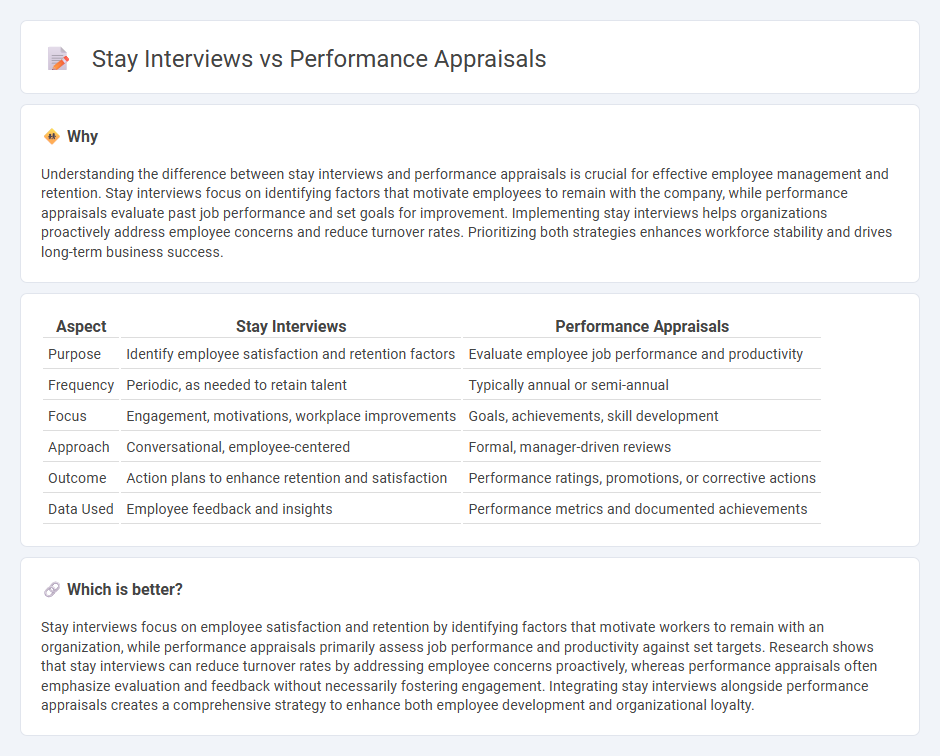
Stay interviews focus on understanding employee satisfaction and retention strategies by gathering real-time feedback, whereas performance appraisals primarily evaluate past job performance against set objectives. Stay interviews help identify factors that influence ongoing engagement, while performance appraisals drive development and accountability through formal evaluations. Explore the differences between stay interviews and performance appraisals to optimize your employee management approach.
Why it is important
Understanding the difference between stay interviews and performance appraisals is crucial for effective employee management and retention. Stay interviews focus on identifying factors that motivate employees to remain with the company, while performance appraisals evaluate past job performance and set goals for improvement. Implementing stay interviews helps organizations proactively address employee concerns and reduce turnover rates. Prioritizing both strategies enhances workforce stability and drives long-term business success.
Comparison Table
| Aspect | Stay Interviews | Performance Appraisals |
|---|---|---|
| Purpose | Identify employee satisfaction and retention factors | Evaluate employee job performance and productivity |
| Frequency | Periodic, as needed to retain talent | Typically annual or semi-annual |
| Focus | Engagement, motivations, workplace improvements | Goals, achievements, skill development |
| Approach | Conversational, employee-centered | Formal, manager-driven reviews |
| Outcome | Action plans to enhance retention and satisfaction | Performance ratings, promotions, or corrective actions |
| Data Used | Employee feedback and insights | Performance metrics and documented achievements |
Which is better?
Stay interviews focus on employee satisfaction and retention by identifying factors that motivate workers to remain with an organization, while performance appraisals primarily assess job performance and productivity against set targets. Research shows that stay interviews can reduce turnover rates by addressing employee concerns proactively, whereas performance appraisals often emphasize evaluation and feedback without necessarily fostering engagement. Integrating stay interviews alongside performance appraisals creates a comprehensive strategy to enhance both employee development and organizational loyalty.
Connection
Stay interviews provide real-time insights into employee satisfaction and engagement, enabling managers to address issues before they impact performance. Performance appraisals evaluate employee achievements and areas for growth, often informed by feedback gathered during stay interviews. Together, they create a continuous feedback loop that enhances employee retention and drives productivity.
Key Terms
Evaluation Criteria
Performance appraisals evaluate employee achievements based on predefined criteria such as productivity, quality of work, and goal attainment, providing structured feedback for development and compensation decisions. Stay interviews focus on understanding employee motivations, engagement levels, and reasons for retention or potential turnover, using qualitative insights to enhance workplace satisfaction. Explore how aligning evaluation criteria in both methods can improve talent management strategies.
Employee Feedback
Performance appraisals provide structured, periodic evaluations of employee performance against set objectives, often emphasizing past achievements and areas for improvement. Stay interviews prioritize ongoing, personalized feedback to understand employee satisfaction, motivations, and concerns, aiming to proactively address retention risks. Explore how integrating these approaches enhances comprehensive employee feedback systems.
Retention Strategies
Performance appraisals evaluate employee achievements and provide structured feedback to align goals with company objectives, playing a critical role in identifying development needs and motivating staff. Stay interviews focus on employee engagement by uncovering reasons employees choose to stay and addressing potential retention risks proactively. Explore further to understand how integrating both strategies can enhance employee retention and organizational success.
Source and External Links
Performance appraisal | EBSCO Research Starters - Performance appraisal is a systematic process for evaluating employee performance relative to predefined standards, providing feedback, identifying improvements, and supporting development, often influencing promotions and salary decisions.
Performance Appraisal: Types, Methods, Benefits, and Criticism - Performance appraisals help measure employee performance against set criteria, motivate through recognition, and require clear communication and fair scheduling to avoid bias and improve productivity.
What is Performance Appraisal? Key Concepts Explained - Performance appraisals are structured reviews assessing job performance to identify strengths and areas for improvement, with types including 360-degree, negotiated, and peer assessments for comprehensive evaluation.
 dowidth.com
dowidth.com